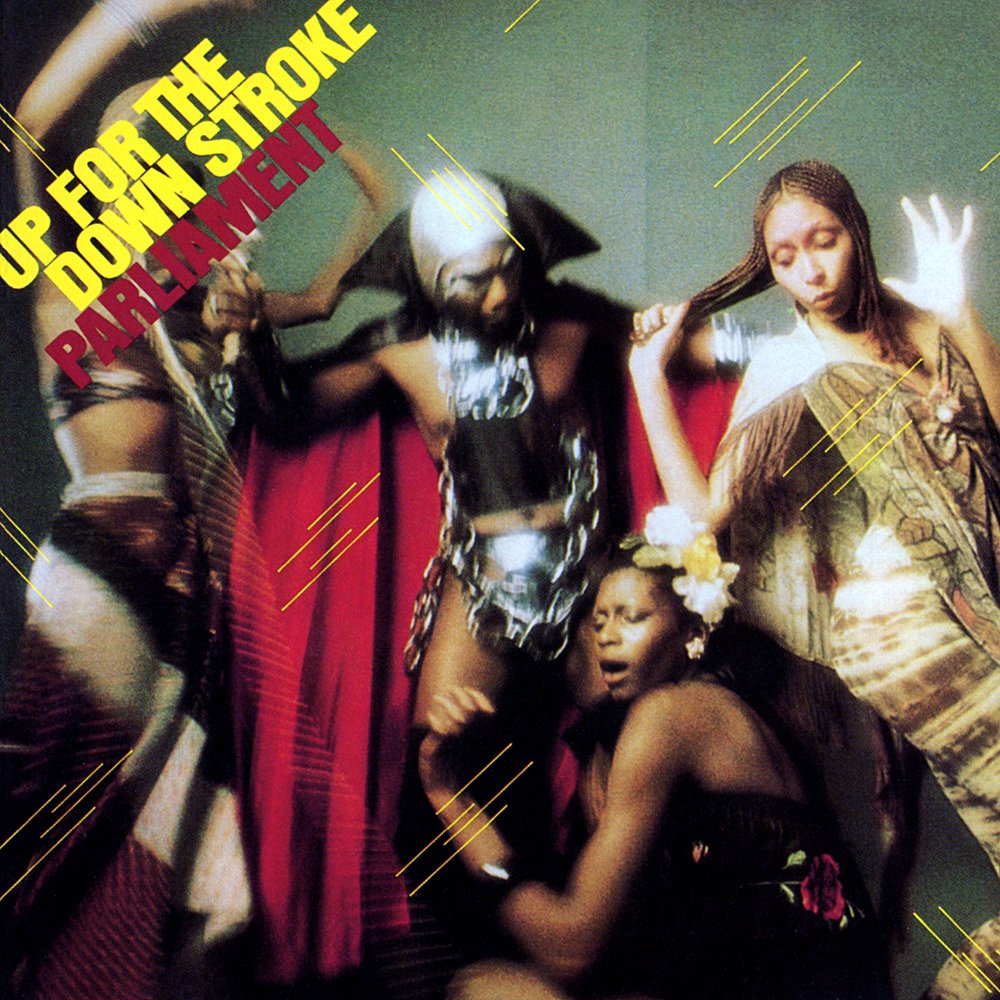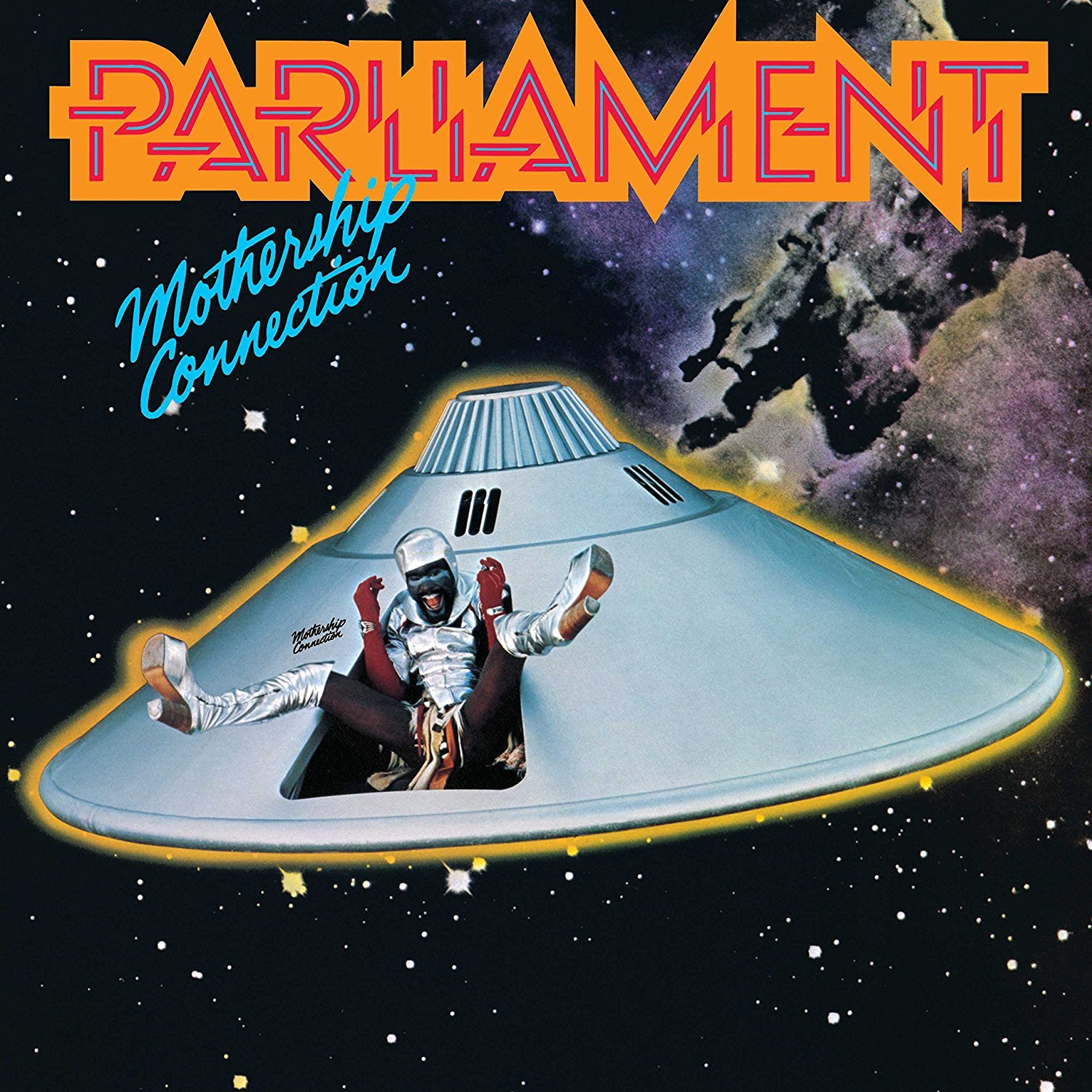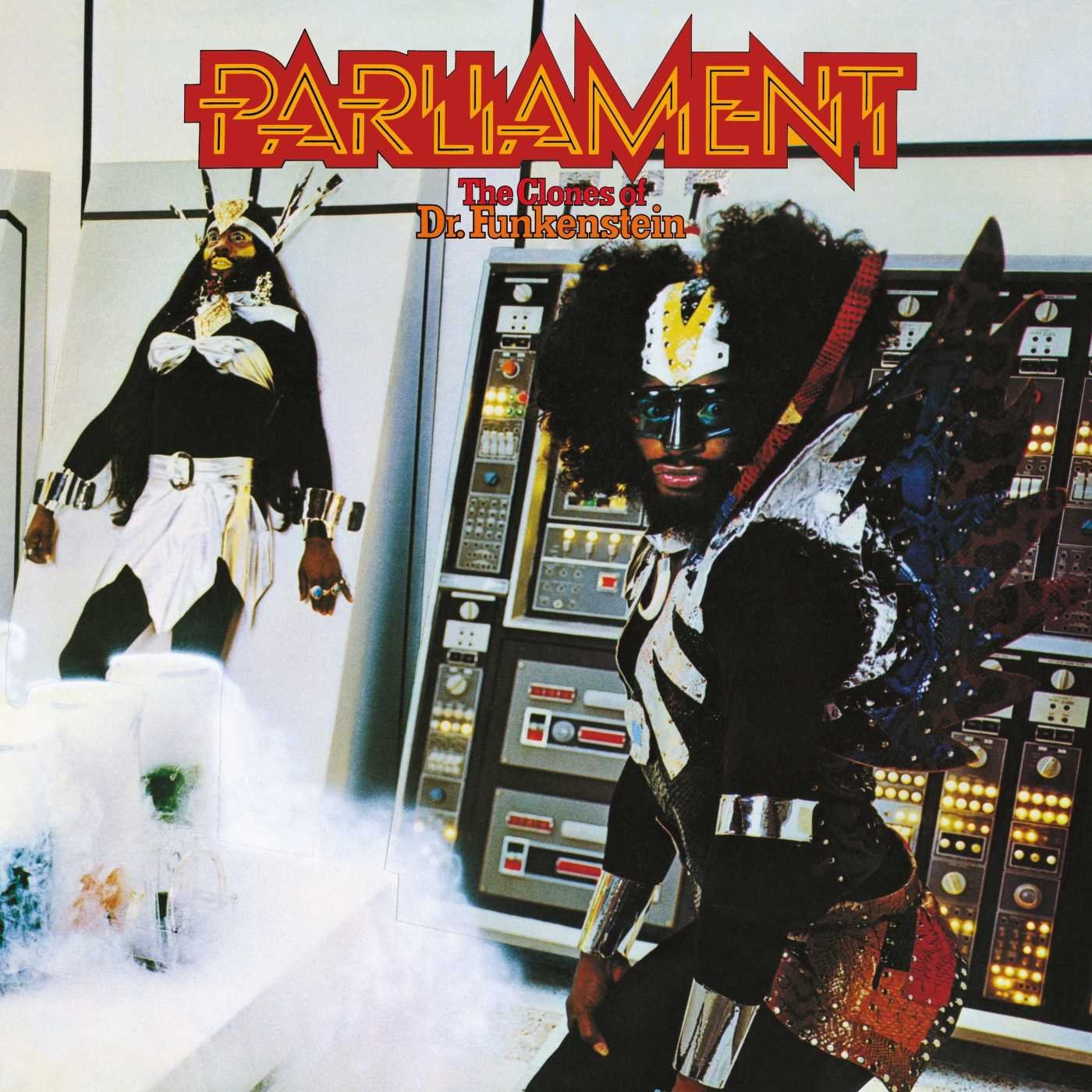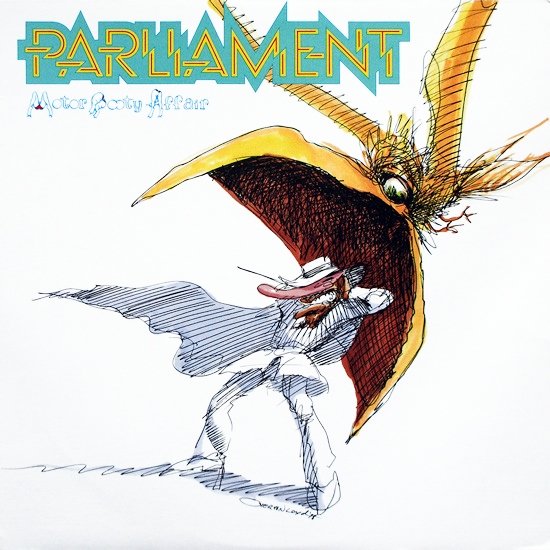Happy 45th Anniversary to Parliament’s sixth studio album Funkentelechy vs. the Placebo Syndrome, originally released November 28, 1977.
As a hip-hop head, I know a lot about the struggles that go on within the genre for control of its “soul.” The struggle between ensuring the music stays “pure” and “real” and crafting music that appeals to as broad of an audience as possible—including the commercial implications that come with it—is a constant dynamic. Hip-Hop gets mocked a lot when this tussle manifests itself on record, but truthfully, every genre of music goes through this identity crisis as it gains popularity. There are always artists who want to make sure that their chosen form of music doesn’t lose sight of its roots and avoids getting watered down. George Clinton and the members of Parliament were fighting this battle 45 years ago with Funkentelechy vs. the Placebo Syndrome. And they did it in the most tripped out Parliament-Funkadelic flavored way possible.
Disco was firmly taking hold in 1977. The Saturday Night Fever film and its accompanying soundtrack were released just weeks before Funkentelechy arrived. The Village People’s self-titled debut album had hit the shelves over the summer. Donna Summer released two albums that year. Even Ringo Starr and Bill Cosby put out disco and “dance oriented” albums that year. And when it came to funk and soul groups, Cameo, The Commodores, and Rufus all released albums that, while excellent, were decidedly influenced by this music that was taking a firm hold of the charts and the dance floor.
It wasn’t that George Clinton had anything against dancing. The Parliament-Funkadelic collective that he spearheaded was basically split into two bands: Parliament and Funkadelic. Through the mid-’70s, Funkadelic mostly recorded acid-soaked rock and blues influenced funk music, while Parliament was a bit more accessible. The majority of Parliament’s output was dedicated to the art of moving butts, and Funkentelechy vs. the Placebo Syndrome itself is devoted to making the listeners dance. However, Clinton did believe that disco was a watered-down version of the funk he had pioneered, and Parliament was still intent on creating that uncut funk.
Funkentelechy vs. the Placebo Syndrome is framed as a battle for the soul of the funk. But since this is George Clinton and Parliament, it was a battle fought through bizarre characters, concepts, and slang, both on record and in accompanying artwork and comics. So, in their terms, it was indeed “Funkentelechy,” the true soul of funk, battling it out against the sanitized, commercial version of dance music, a.k.a. “the Placebo Syndrome.” Even though Funkentelechy vs. the Placebo Syndrome was Parliament’s most “dance oriented” album to date, it was always firmly rooted in the unique style that Clinton and his crew developed.
Both sides had their respective champions. In one corner stood the Starchild, funk’s champion, protector of the Pleasure Principle, journeying across the cosmos in the Mothership and armed with the Bop Gun. In the other corner is Sir Nose D’Voidoffunk, the Subliminal Seducer and a funkless entity who swears that he will never dance. Clinton had been using the Starchild alias since Parliament’s masterful Mothership Connection (1975), while the idea of Sir Nose appears to have been inspired by a line from a song by P-Funk all-star Bootsy Collins released earlier that year. During the intro to the single “The Pinocchio Theory,” Collins proclaims, “Don’t fake the funk or your nose will grow!” And thus Starchild’s arch-nemesis was born.
Listen to the Album:
Parliament’s line-up for Funkentelechy vs. the Placebo Syndrome was, as usual, a functional P-Funk All-Star band. Beyond band-leader Clinton, it included, among many other, Gary Shider on lead guitar, Glenn Goins on guitar and vocals, Cardell Mosson on bass, Fred Wesley and Maceo Parker on trombone and saxophone respectively, Jerome “Bigfoot” Brailey on drums, and the incomparable Bernie Worrell on keys. Brothers Bootsy and Phelps “Catfish” Collins contributed their talents to one track on the album, and the Brides of Funkenstein sang background vocals on a few tracks. All involved are on the top of their game here, but Funkentelechy really showcases the brilliance of Worrell. The mid to late ’70s were Worrell’s golden era, and he was demonstrating his brilliance across of Parliament-Funkadelic's material.
Funkentelechy leads off with “Bop Gun (Endangered Species),” which serves as the introduction to Starchild’s weapon of choice. The principles of operation of said Bop Gun are straightforward: blast someone decidedly un-funky, and they will dance. The song’s hard-charging rhythmic tempo is controlled by the Horny Horn brass section and Brailey’s pulsing drums, while Worrell’s flourishes on the keys make things upbeat and lively. Goins has the lead vocal on the song, and he is as brash and bold as ever, bellowing the empowering rallying cries of “Turn me loose! We shall overcome! Where’d you get that funk from?” and “Gotta get over the hump!” Goins possessed a powerful and resonant voice, and became known for being the member of the group who “calls the Mothership” during Parliament live shows. “Bop Gun” would be Goins last contribution to a Parliament-Funkadelic song, as he and others left the group soon after this album was released. He formed the group Quazar in 1978, before dying later that year due to Hodgkin’s Lymphoma.
The album next introduces its aforementioned villain on the aptly named “Sir Nose D'Voidoffunk (Pay Attention - B3M).” The song begins with Sir Nose delivering his soliloquy, stating in no uncertain terms that he will never dance. Then over a piano-driven groove, Clinton as Starchild recites drug-related nursery rhymes. While he dabbles in switching up “Ba Ba Black Sheep,” he’s mainly concerned with the Blind Three Mice (the B3M from the song’s title), declaring that he “loves those meeces to pieces.” Starchild also dedicates himself to “chasing the noses away,” and hunting Sir Nose, who he puts on notice by asserting, “Put that snoot to use, you mutha! 'Cause you will dance, sucker!” Meanwhile, the Brides of Funkenstein repeatedly chant, “Syndrome, Tweedle-dee-dee-dum. Humdrum, don't succumb.”
At a hair under 11 minutes, “Funkentelechy” is the only song on the album that feels its length. Clinton shifts personas, this time playing the role of the Lollipop Man, last seen on the Mothership Connection album. Over a bouncy bassline and shimmering horns, the radio DJ repeats jingle-like catchphrases, touting “Funkentelechy” as the cure to the fakeness and diminishing returns of disco music. After stating, “You might as well pay attention if you can't afford free speech,” Clinton “sells” his product by repeating such expressions as “The bigger the headache, the bigger the pill,” “Pecking lightly, like a woodpecker with a headache,” and “Funk is a non-profit organization.” But, on this song, the horn section led by Wesley and Parker is the star, as they keep the track moving and contribute the heavy funk on the breakdowns and the bridge.
The crew does switch things up a couple of times on Funkentelechy. “Wizards of Finance” seems to exist outside the album’s theme. The song is about as close Parliament came to recording a straightforward R&B/Soul ballad, but still shows flashes of the group’s early doo-wop influences. “The Placebo Syndrome” is a decidedly more funk-influenced ballad. Here band-member Billy Nelson takes center stage, as he lends his melodious vocals and his watery bass playing to the song. Worrell’s keys and the Horny Horns section bolster the track, which warns of the dangers to submitting to “the syndrome,” or, once again, faking the funk.
Funkentelechy closes with not only one of Parliament’s best songs, but also one of the best funk songs ever recorded. “Flash Light” is a shining beacon of the power of the funk. It showcases the battle between Starchild and Sir Nose. The clash goes as predicted, with Starchild blasting Sir Nose with the Bop Gun, shining “the spotlight on ’em,” and making him dance despite protestations.
The song features the talents of the Collins brothers, as Catfish contributes some of the best guitar playing of his career, and Bootsy is understated yet flawless on the drums. Clinton contributes lead vocals this time around, playing the roles of both the hero and the antagonist, narrating Sir Nose’s defeat, triumphantly declaring, “Everybody's got a little light under the sun!” But its Worrell who’s the star again, and he displays astounding skills on the keys, playing both the lead synth, and creating a bassline through a complimentary synth track as well. His works on the lead synth is almost beyond comparison, as he plays complicated runs and creates a soaring whirlwind of funk energy.
“Flash Light” is an example of how a funk track can be accessible yet remain true to the group’s roots. No wonder then that it is arguably Parliament’s most successful single, capturing the #1 spot on the U.S. R&B charts, going platinum, and becoming one of their trademark songs. And it’s still a great song to dance to.
Funkentelechy vs. the Placebo Syndrome represents the end of Parliament-Funkadelic’s second act. As mentioned above, the band’s members began exiting the fold in 1978, even as they still churned out excellent music for the next four years. However, from 1978 on, the musical differences between the Parliament and Funkadelic incarnations of the group were virtually non-existent, as both sides moved towards creating more anthemic funk tracks.
But on the Parliament side of the equation, Starchild and Sir Nose would continue their “battle” on record. Though true funk music persevered, disco wasn’t going anywhere, at least in the immediate future (the infamous “Disco Demolition Night” at Chicago’s Comiskey Park was still over a year and a half away). So Clinton and Parliament continued to create quirky concepts and characters to convey his message of positivity and funk’s ability to conquer all. With Funkentelechy vs. the Placebo Syndrome, they were successful, as it’s one of the most enduring funk albums ever recorded.
LISTEN:
Editor's note: this anniversary tribute was originally published in 2017 and has since been edited for accuracy and timeliness.
Enjoyed this article? Click/tap on the album covers to explore more about Parliament:





